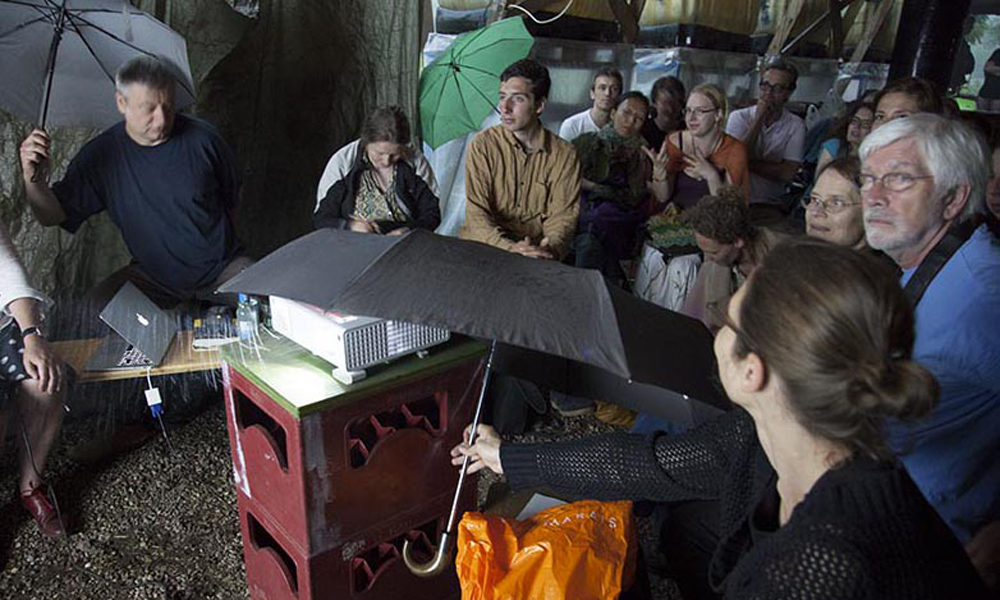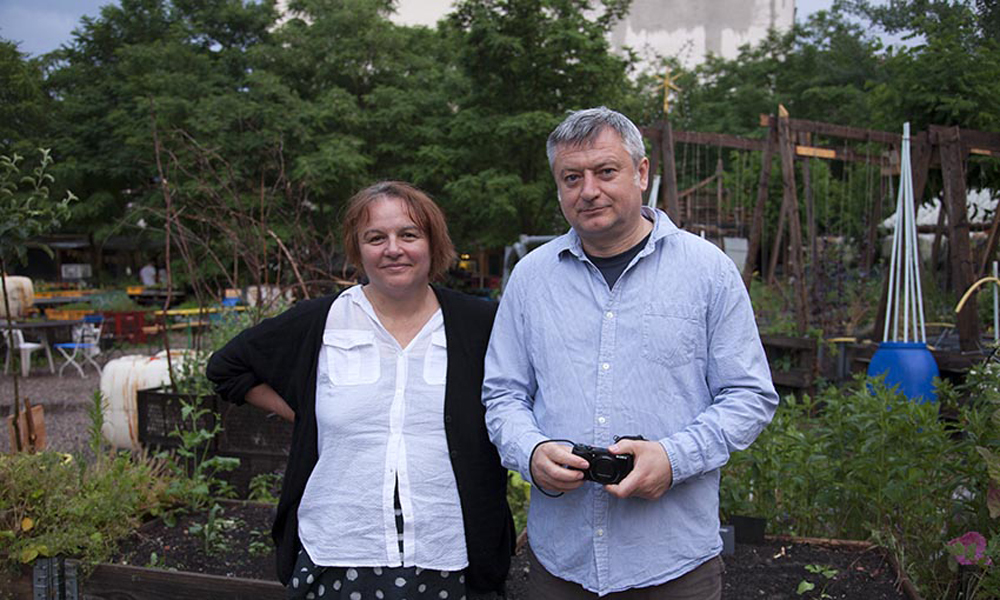Atelier d’architecture autogérée
Guests at the Neighbourhood academy Saturday evening of June 13

Under an open roof in Prinzessinnengarten, the Neighbourhood Academy spent the Saturday evening in the company of Doina Petrescu and Constantin Petcou from the renown Atelier d’architecture autogérée (aaa), an architect activist group working with alternative strategies and tactics for a bottom up transformation of the city by its inhabitants. Founded in Paris in 2001, the platform includes architects, artists, urban planners, landscape designers, sociologists, students and residents. aaa facilitates the re-appropriation of space by residents and the creation of places for new collective practices and reinvented urban commons.
Bravely outstanding the heavy rains and thunderstorms, we learned about aaa’s project Ecobox initiated in la Chapelle area of northern Paris in 2001, transforming misused or underused spaces into places of ‘urban bio-diversity’, as well as we learned about their recent project R-Urban, building resilience networks through a series of urban facilities, everyday practices and civic activities in the municipality of Colombes, northwest of Paris. The Civic Agriculture Unit Agrocité and the Recycling and Eco-construction Unit Recyclab were built between 2012 and 2014. The Ecological Cooperative Housing Unit Ecohab is under planning.

The R-Urban network has the potential to grow gradually, involving a diversity of local residents and evolving into a large-scale civic movement. Though instead of discussing challenges and possibilities for such process, the end discussions were altered by the recent news that the project is cancelled by the newly elected conservative mayor of Colombes, who demands the structures to be evicted in order to give place to a parking lot. This urgent and critical situation for R-Urban as well as for similar transformative projects (Prinzessinnengarten whose contract runs only until 2018 maybe becoming one of them) turned the focus of the discussion towards the legal dimensions of city planning and the question of who’s rights the legal system is protecting.
Atelier d’architecture autogérée
Guests at the Neighbourhood academy Saturday evening of June 13

Under an open roof in Prinzessinnengarten, the Neighbourhood Academy spent the Saturday evening in the company of Doina Petrescu and Constantin Petcou from the renown Atelier d’architecture autogérée (aaa), an architect activist group working with alternative strategies and tactics for a bottom up transformation of the city by its inhabitants. Founded in Paris in 2001, the platform includes architects, artists, urban planners, landscape designers, sociologists, students and residents. aaa facilitates the re-appropriation of space by residents and the creation of places for new collective practices and reinvented urban commons.
Bravely outstanding the heavy rains and thunderstorms, we learned about aaa’s project Ecobox initiated in la Chapelle area of northern Paris in 2001, transforming misused or underused spaces into places of ‘urban bio-diversity’, as well as we learned about their recent project R-Urban, building resilience networks through a series of urban facilities, everyday practices and civic activities in the municipality of Colombes, northwest of Paris. The Civic Agriculture Unit Agrocité and the Recycling and Eco-construction Unit Recyclab were built between 2012 and 2014. The Ecological Cooperative Housing Unit Ecohab is under planning.

The R-Urban network has the potential to grow gradually, involving a diversity of local residents and evolving into a large-scale civic movement. Though instead of discussing challenges and possibilities for such process, the end discussions were altered by the recent news that the project is cancelled by the newly elected conservative mayor of Colombes, who demands the structures to be evicted in order to give place to a parking lot. This urgent and critical situation for R-Urban as well as for similar transformative projects (Prinzessinnengarten whose contract runs only until 2018 maybe becoming one of them) turned the focus of the discussion towards the legal dimensions of city planning and the question of who’s rights the legal system is protecting.
Atelier d’architecture autogérée
Guests at the Neighbourhood academy Saturday evening of June 13

Under an open roof in Prinzessinnengarten, the Neighbourhood Academy spent the Saturday evening in the company of Doina Petrescu and Constantin Petcou from the renown Atelier d’architecture autogérée (aaa), an architect activist group working with alternative strategies and tactics for a bottom up transformation of the city by its inhabitants. Founded in Paris in 2001, the platform includes architects, artists, urban planners, landscape designers, sociologists, students and residents. aaa facilitates the re-appropriation of space by residents and the creation of places for new collective practices and reinvented urban commons.
Bravely outstanding the heavy rains and thunderstorms, we learned about aaa’s project Ecobox initiated in la Chapelle area of northern Paris in 2001, transforming misused or underused spaces into places of ‘urban bio-diversity’, as well as we learned about their recent project R-Urban, building resilience networks through a series of urban facilities, everyday practices and civic activities in the municipality of Colombes, northwest of Paris. The Civic Agriculture Unit Agrocité and the Recycling and Eco-construction Unit Recyclab were built between 2012 and 2014. The Ecological Cooperative Housing Unit Ecohab is under planning.

The R-Urban network has the potential to grow gradually, involving a diversity of local residents and evolving into a large-scale civic movement. Though instead of discussing challenges and possibilities for such process, the end discussions were altered by the recent news that the project is cancelled by the newly elected conservative mayor of Colombes, who demands the structures to be evicted in order to give place to a parking lot. This urgent and critical situation for R-Urban as well as for similar transformative projects (Prinzessinnengarten whose contract runs only until 2018 maybe becoming one of them) turned the focus of the discussion towards the legal dimensions of city planning and the question of who’s rights the legal system is protecting.


